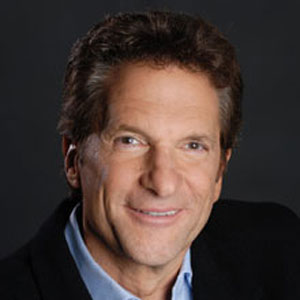Peter Guber On 'Tell To Win'
Peter Guber, the Chairman and CEO of Mandalay Entertainment Group, has had a lifelong Hollywood career. Guber has also been in charge at Sony Pictures Entertainment, Polygram Entertainment and Columbia Pictures. He is behind five films that have been nominated for Best Picture Academy Awards, and churned out countless other Hollywood hits. He also happens to be the owner of the Golden State Warriors and co-owner of the Los Angeles Dodgers.
Well, I think telling stories – not storytelling – is important. The idea is they create an emotional connection with the audience. And the idea is that emotional connection is how we hold the information. We have to hold it in some format. We’re wired for that. We’re all in the emotional transportation business. We metabolize the information that way. So why is it important? Where success is born is by aiming at the heart. Being able to emotionalize your offering. The idea is that a brand, or a product, or a service can do that. And the idea is we pay forward the story. We don’t pay forward the facts. It’s the telling that gives the resonance, power and a call to action, in whether it’s any type of product, service, or opportunity. I think that the idea is, if you can’t tell it in the world today, you won’t be able to sell it.
The concept there that I’m getting at is telling purposeful stories. The idea of being able to tell it there, face to face, breathing the same air — that that’s a secret sauce to success. So let's go through all the different goals. First, question is motivation. Not only are you motivating the other person, but are you motivating yourself. That integrity shines through. Are your feet, tongue, heart, wallet going in the same direction? Are you authentic? That’s going to shine through. The second part: If you look at them as customers or clients, you’re not going to get that benefit. Think of them as audiences. How do you render experience to the audience. You first have to be interested in them, rather than try to be interesting. So that’s really a critical component. What’s interesting for them? And tell that story, through that interest, through that filter. And audiences are all different, but they all want to be moved, they all want to participate. So what does that mean? And you have to understand that they’re busy. Lots of things going on in their mind. How do you disrupt that? How do you get their attention before their intention. If you don’t get their attention, you’ll never get their intention. One of the ways of doing that is knowing what they’re interested in. Don’t go into the room hiding your goal. People will get the impression that you’re hiding. There’ll be a lack of trust. To tell a purposeful story, you have to be interactive. They’re participants. Not passengers. All of those little simple tools change the whole game. And then, of course, there’s the story itself, its content. That’s everywhere. Everywhere we breathe. It’s in movies, television, books. Anything can be hijacked, utilized, and ridden as a Trojan Horse, to create the emotional resonance of your offering. Those are the tenants of it. Look around, every great priest, every terrific leader, every pop commentator, every politician, every brand organizer, every great businessman, whether it’s Jack Welch or Steve Jobs – literally every single person that has achieved any reasonable modicum of success, it is the tool they’ve used.
I think there are a lot of them in different areas. In medicine, Deepak Chopra; Steve Jobs in technology. Jack Welch in business. Obama as a president. Clinton was a great storyteller. Reagan was a great storyteller. And in finance, Robert Rubin dealt with the public in a quiet and powerful way. People who use their character to propel a story, whether it’s Anderson Cooper or Walter Cronkite.
Well, first of all, when you gauge people through the lens of time, it gets foggier, and you remember less the pain and more the joy. So I think comparing him out of context it’s not a good analysis. If you ask yourself, how does time treat storytellers, Abraham Lincoln was treated as a phenomenal storyteller. I’m not sure if he was under the lens of modern day cameras, or television that he would be judged the same. You judge it in the context of things and times. One time, I was sitting listening to Muhammad Yunus, who won the Nobel Prize. He was sitting there talking with Nelson Mandela, and he was just so compelling and it’s not just that he's charismatic; it just means that he really understand the tools that are necessary to move people’s heart. And move people’s souls and beings. And how do we do it? There is no single ingredient. People like to feel like they’re participants and they’re being heard. So it’s the tool of choice for success.
Well, you've heard the expression word of mouth. The idea of the power of the tell, of telling a purposeful story, is the content of the story. The call to action. Buy my product. Vote for my client. Take my medicine. Join my club. Participate in my church. Follow my tribe. All those things are calls to action. But the power of telling to win is what it does. It stops people from being transactional; it creates purveyors of the tale. What they do is pay it forward. It turns people into apostles and advocates. And you can’t buy that. You can’t get a customer acquisition – new one every single time – you have to have people do it for you. And that’s one of the elements of the whole thing. It becomes their word of mouth. They own it. And that’s one of the secret sauces in the whole thing. You’re giving them an emotional experience. And they want to share with somebody because they want that feeling.
I think you gotta turn “me” into “we.” When you’re telling a purposeful story to get somebody to buy your project, to join your company, or you’re asking for a raise or a promotion, or you want folks to follow your lead on something. If you think of it instead of a “me” situation, think of it as a “we” situation and recognize that if you have emotional resonance with somebody in a powerful way, you have a powerful ally in getting them to act. It stays long after the words are heard. It stays in their heart; it stays in their soul. So the idea is when you emotionalize your offering, when you find a way to tell it in that fashion, what you do is you convert people from a transactional base to a relationship base. And relationships endure. And so that’s really what happens. You moved into a trust phase and relationship phase, and relationships support transaction and that’s one of the magic components of it that’s so powerful.
RELATED ARTICLES
Get the most-revealing celebrity conversations with the uInterview podcast!






Leave a comment